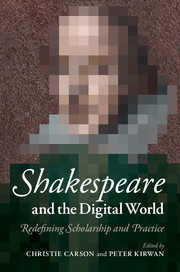Book contents
- Frontmatter
- Contents
- Notes on contributors
- Acknowledgements
- Shakespeare and the digital world
- Part I Defining current digital scholarship and practice
- Part II Defining current digital scholarship and practice
- 5 Internal and external Shakespeare
- 6 Shakespeare at a distance
- 7 ‘All great Neptune’s ocean’*
- 8 ‘From the table of my memory’*
- Half-time: A pause for reflection
- Part III Redefining the boundaries and practices of Shakespeare studies online
- Part IV Redefining the boundaries and practices of Shakespeare studies online
- Index
- References
7 - ‘All great Neptune’s ocean’*
iShakespeare and play in a transatlantic context
Published online by Cambridge University Press: 05 July 2014
- Frontmatter
- Contents
- Notes on contributors
- Acknowledgements
- Shakespeare and the digital world
- Part I Defining current digital scholarship and practice
- Part II Defining current digital scholarship and practice
- 5 Internal and external Shakespeare
- 6 Shakespeare at a distance
- 7 ‘All great Neptune’s ocean’*
- 8 ‘From the table of my memory’*
- Half-time: A pause for reflection
- Part III Redefining the boundaries and practices of Shakespeare studies online
- Part IV Redefining the boundaries and practices of Shakespeare studies online
- Index
- References
Summary
Experience is by industry achieved And perfected by the swift course of time.
(Two Gentlemen of Verona 1.3.22–3)In his 2011 study, which explores how ongoing advances in neuroscientific research continue to inform pedagogical theory, the biologist, biochemist and educational theorist James E. Zull remarks, ‘If we continue to count on education for development of the mind, we need to change education itself’:
We must provide experiences and challenges for the brain that strengthen the mind; ones that technology does not address, or that build further on technology.
(2011: 3)Like an Olympic athlete who embarks on a regime of training and challenging self-discipline, the human brain (and the cognitive mind it accommodates) must likewise, so Zull suggests, be exercised and strengthened. Experiences and challenges fuel this strengthening process, allowing the brain and mind to develop to the peak of performance and endurance. Physiology, neuroscience, biology, all feed the synaptic expansion of the brain’s potential, making the learning experience – ‘education itself’ – the site of radical and revolutionary new pedagogical procedures.
As Zull’s comments highlight, however, a late twentieth- and early twenty-first-century problem with the adoption of new technologies, one that technology specifically ‘does not address’, is the dulling receptivity that it invites in individuals who focus solely on isolated, restrictively personalised virtual experiences. All pervasive in private and public social interaction, technology should be able to ‘address’ this problem. Unfortunately, there is limited financial incentive for devices designed for mass consumption to be made more experientially demanding. Ease of use rather than intellectual challenge holds the commercial key. Nevertheless, Zull’s comments suggest that, although technology might be the problem, it might also offer new and radical solutions.
- Type
- Chapter
- Information
- Shakespeare and the Digital WorldRedefining Scholarship and Practice, pp. 87 - 99Publisher: Cambridge University PressPrint publication year: 2014

